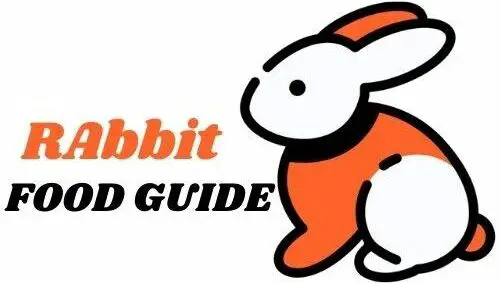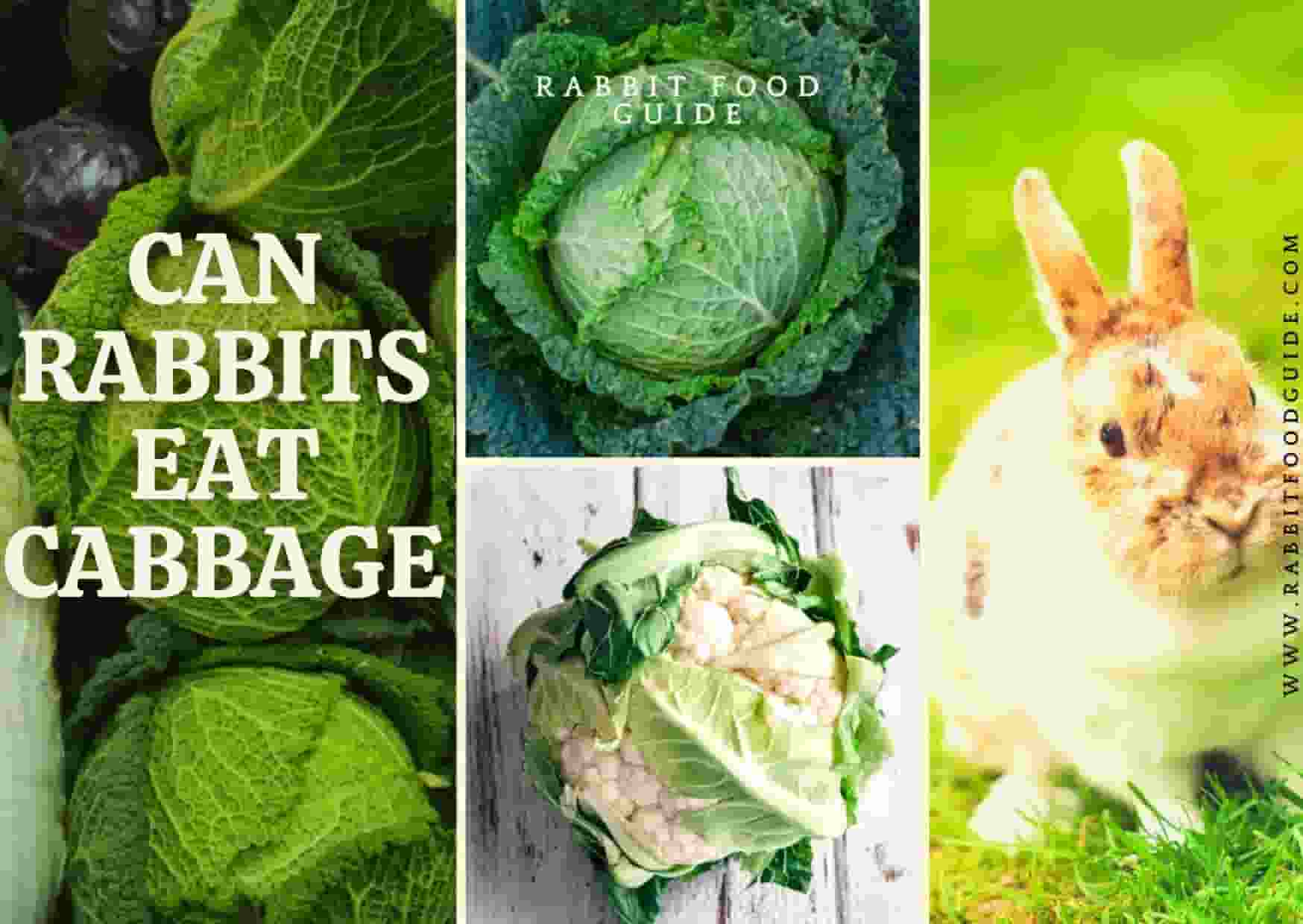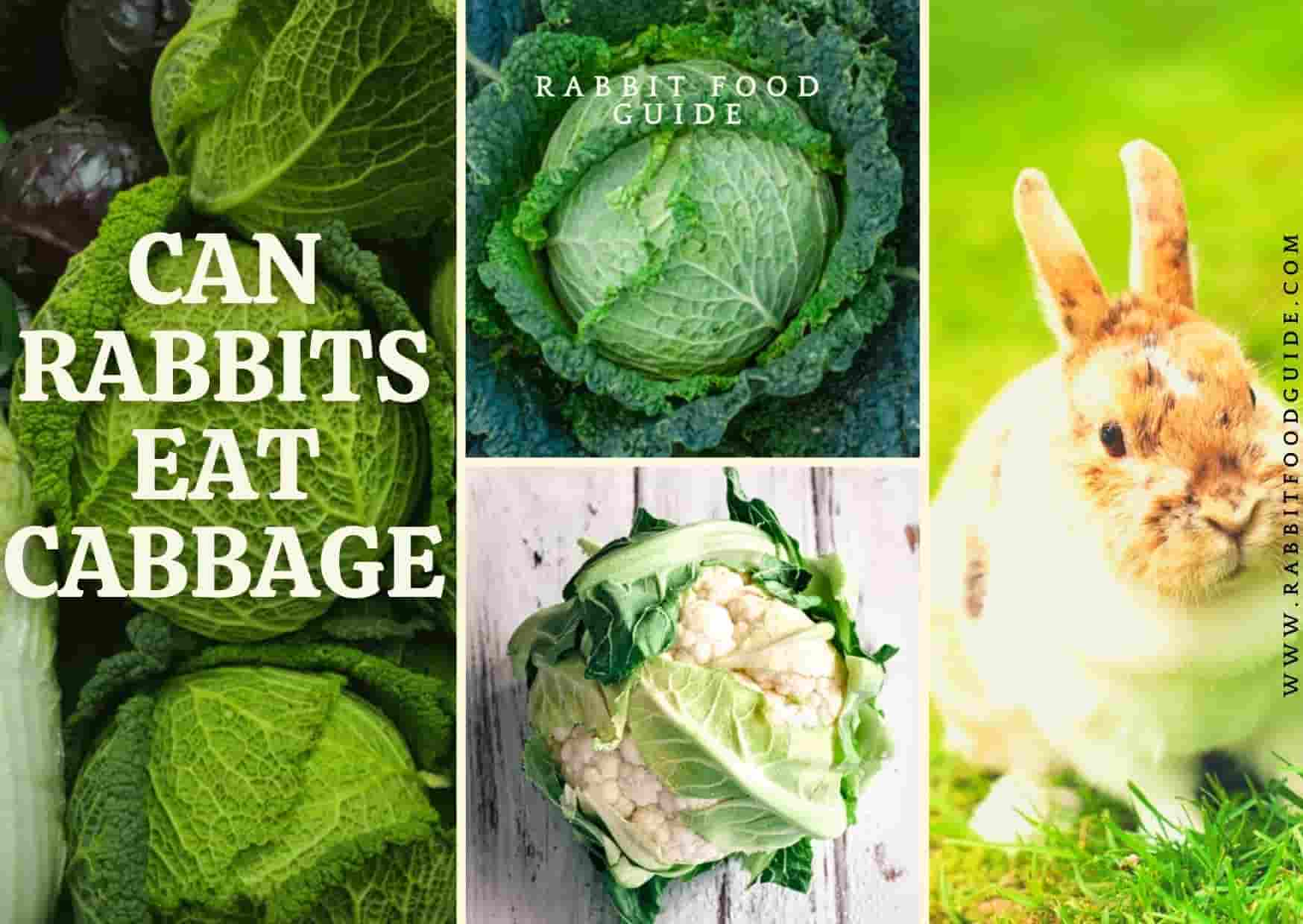
Table of Contents
Can Rabbits Eat Cabbage?
Can rabbits eat cabbage? Yes. If you’re looking for a good healthy leafy green for your loving rabbits, Cabbage is a good option for you. Cabbage is good nutritional food for rabbits. We can find cheap cabbages in the market and those are available all year round. Most of the rabbit owners and veterinarians recommend Cabbage as a good leafy vegetable for rabbits. There are no toxic parts in cabbage that will harm rabbit’s health. Don’t overfeed too much of cabbage for your rabbits, it can lead to gastrointestinal distress in your rabbits. We can serve them several times per week in moderation. Bok Choy is also related to the Cabbage Family.
Rabbits are herbivores. But we can’t provide a full diet with herbs, vegetables, and fruits. Rabbits’ major food source must be fresh quality hay and grass. They take almost all the nutrition from hay supplies. We can serve a small number of leafy green herbs in their daily diet as other nutritious foods. Cabbage can provide extra nutrition to your rabbits as a part of a balanced diet. Cabbage can provide many health benefits to rabbits and also there is a potential health risk to rabbits if we overfeed them. This article covers all the health benefits, nutrition facts, overfeeding health issues & many more things that you should know before feeding Cabbage to your rabbits.
Let’s start without any delay!!!
Extra Information About Cabbage
The cabbage plant is categorized into the Brassicaceae family. There are 3 main types of cabbage. They are White cabbage, Red cabbage, and Savoy cabbage. Cabbage has many leaves and they are tightly packed together like a ball. Cabbage is the primary vegetable among most people. Cabbage can eat after boiling or steaming. Cabbages are related to Broccoli, Brussels sprouts, Bok Choy, and cauliflower.
Cabbage is now regarded as the most nutritious vegetable. Cabbage comes with good health benefits and many nutrition. These vegetables are high in vitamin C, vitamin K, vitamin A, vitamin B complex, dietary fiber, folate, potassium, and manganese, etc. And cabbages are low in fat and cholesterol. Cabbage is a good vegetable that helps to keep inflammation, improve digestion, keep healthy blood pressure and healthy heart, maintain low cholesterol levels land many other health benefits.
According to the USDA United States Department of Agriculture, 100g of Cabbage has these nutrients.
| Water | 92 g |
| Energy | 103 kJ |
| Carbohydrates | 5.8 g |
| Dietary fiber | 2.5 g |
Vitamins and minerals
| Vitamin B6 | 0.124 mg |
| Folate (B9) | 43 μg |
| Vitamin C | 36.6 mg |
| Vitamin K | 76 μg |
| Calcium | 40 mg |
| Magnesium | 12 mg |
| Phosphorus | 26 mg |
| Potassium | 170 mg |
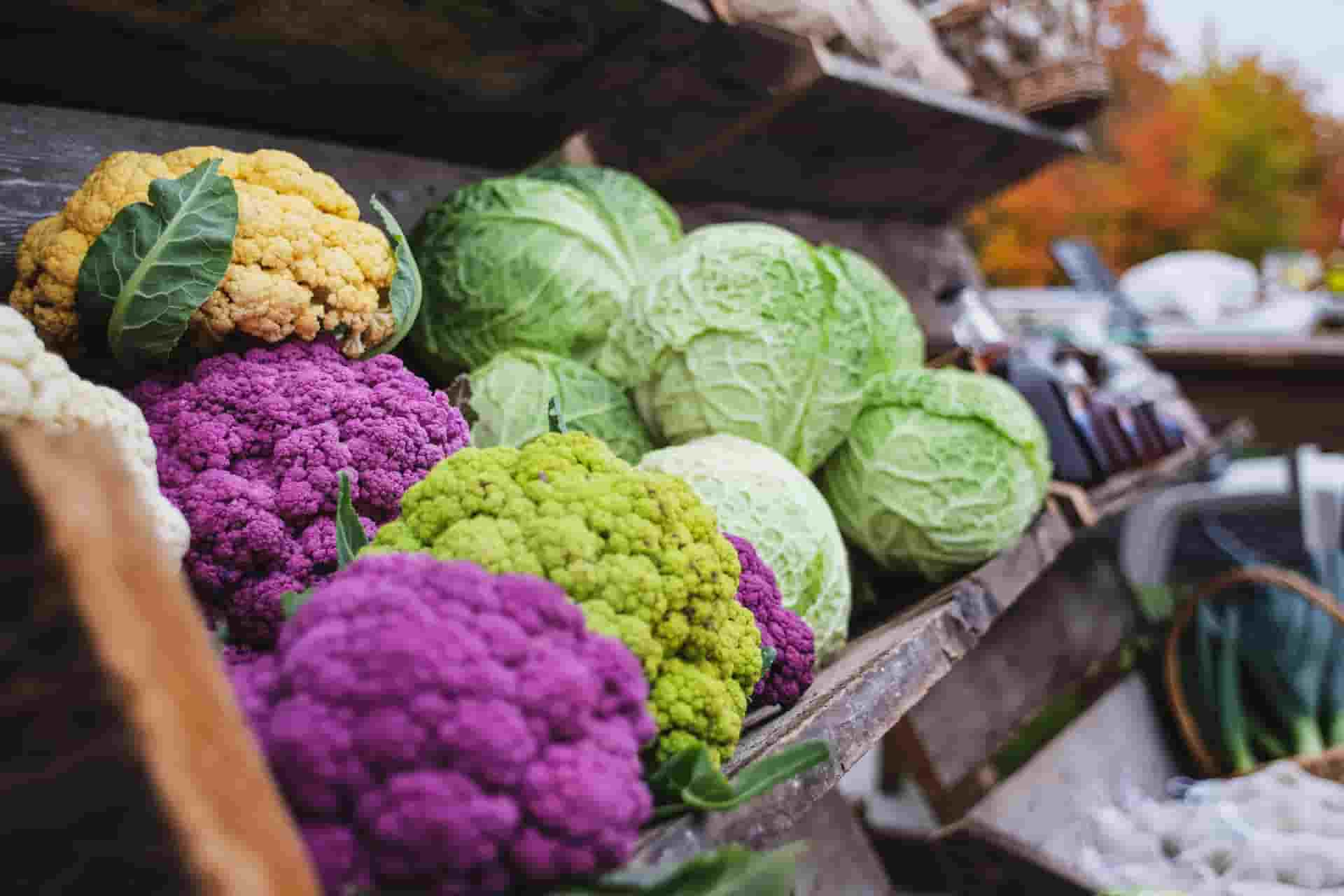
Types Of Cabbages Safe For Rabbits
All common varieties are safe to serve for rabbits. But keep in mind to only feed them a limited amount in moderation. When you buy cabbage always look for crisp leaves and cabbages that have bright colors. Always supply fresh and good cabbages for rabbits. There are 4 common types of cabbages that we can easily find. Red cabbage, White cabbage, Savoy cabbage, and Green Cabbage.
Green Cabbage: This is the most common variety among people. This cabbage looks just like iceberg lettuce. Generally, outer green cabbage leaves are dark pale green color and inside leaves are a whitish-green color. Green cabbages are soft and sweet.
Red Cabbage: These cabbages take more time to mature. This cabbage has red to purple color leaves.
Savoy Cabbage: This cabbage is similar to green Cabbage. Savory cabbage is considered as the most tender and sweet cabbage among other varieties.
Napa Cabbage: This cabbage is also called Chinese cabbage. Napa cabbage comes in a yellow-green color. This cabbage can be eaten raw or after cooking.
Rabbits can safely eat any variety of cabbage, but we must serve them only a limited amount. Most of the types of cabbage in the market are applied with chemicals and pesticides. Make sure to wash them before feeding your rabbits.
Do Rabbits Like To Eat Cabbage
Most of the time rabbits like to eat Cabbage. Because they like the sweet taste and the crunchy texture in Cabbage. But it depends on your rabbit’s taste. They may not like Cabbage. Try to provide a small portion of Cabbage and check how they react to Cabbage. If they like those you can provide a small portion to your rabbits a few times per week.
Cabbage is one of the good vegetables that we can give to our loving rabbits.
Is Cabbage Good For Rabbits?
Yes, it is safe for rabbits. Cabbage is a good source of food for rabbits. These vegetables are high in vitamin C, vitamin K, vitamin A, vitamin B complex, dietary fiber, folate, potassium, and manganese, etc. Antioxidants can help your rabbits to prevent illness and maintain body health. But you should offer only a small amount in your rabbit’s daily diet. Overfeeding them can lead to health issues like diarrhea or loose stools. Always limit the amount of cabbage provided for rabbits.
We must only feed fresh raw Cabbage to rabbits. We can provide Cabbage as leaves or pieces of Cabbage leaves. Avoid feeding cooked Cabbage for rabbits. If you bring Cabbage from the market wash them thoroughly before feeding to your rabbits. (Remove wax and pesticides)
Rabbits’ main food source should be hay. We should prioritize hay in the regular diet plan. Overall nutrition can be covered by hay. Unlike humans, fiber is essential for rabbits. It can prevent bad bacteria from forming in the intestines. Some of the bacteria can lead to critical health issues in rabbits. This is why we should give priority to hay. But rabbits can’t live eating hay all day long. We must add veggies and fruits to their daily diet. Cabbages are one of the good vegetables we can provide to rabbits in moderation.
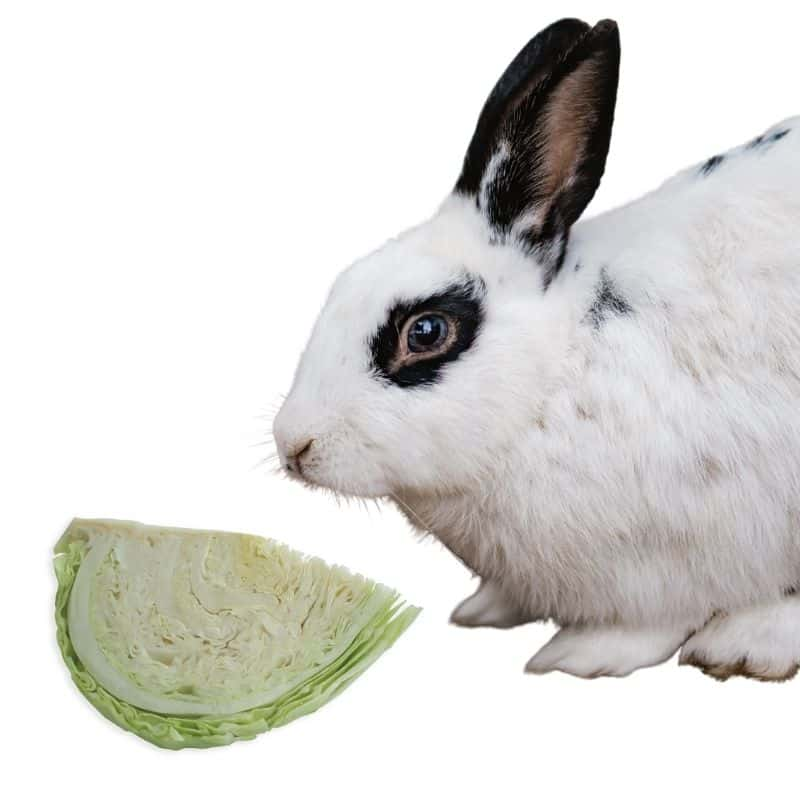
How Often Rabbits Can Eat Cabbage
We need to provide any vegetables or fruits according to the diet plan. Most of the vegetables are good for rabbits. Even good vegetables can be harmful if we do not serve them in the correct amount.
Cabbage is low in oxalates and we can provide few times per week for rabbits. We can give Cabbage 4-5 days per week, that is more than enough for rabbits. Also, we can mix with other veggies like carrots, Cilantro, and parsley, etc. We can provide 4-5 cabbage leaves for adult rabbits. If you are introducing Cabbage for the first time to your rabbits, first-serve a small amount and check whether they react it well and whether they show any side effects like bloating or diarrhea.
Benefits From Cabbage For Rabbits
Cabbage contains important nutrition for rabbits. Cabbages are high in vitamin C, vitamin K, vitamin A, vitamin B complex, dietary fiber, folate, potassium, and manganese, etc. Cabbage is a rich source of antioxidants that help rabbits to reduce cell damage and prevent any diseases. Cabbage has low oxalate and sugar level that make them a good food source for rabbits as a vegetable. And it contains a high amount of water that helps to keep the rabbit’s body hydrated and healthy. The fiber content in Cabbage improves the rabbit’s gut mobility.
Cabbages are rich in vitamin C and can help to prevent diseases and illnesses. Vitamin C acts as an antioxidant in your rabbit’s body. Rabbits can produce their own vitamin C. If we increase healthy levels of vitamin C, it can lead to kidney problems in rabbits. Because of that, we must not overfeed Cabbage to rabbits.
Cabbage contains a good amount of vitamin K, it’s an important nutrient for rabbit’s bone health and blood clotting. Cabbage also has anti-inflammatory health properties that are good for rabbits’ health. Cabbage contains glucosinolates that can help to prevent cancers.
Proper Guide To Feed Cabbage For Rabbits
As we know now, cabbage is good, natural food for rabbits. But there is a guide you must follow before feeding Cabbage. Let us check it out.
Before introducing Cabbage to rabbits for the first time, you need to start up with small portions. Keep monitoring them 24 hrs & check whether they show some illness such as diarrhea, lethargy, constipation, and loss of appetite. If they do not show any kind of illness, you can increase the amount slightly to your rabbit. Don’t try to introduce many kinds of foods at the same time & try to give the same food until they are fully adapted to eat. Keep in mind to introduce a small portion of the new food with other regular foods (daily diet). Follow up the rules for better rabbit health.
Preparing Cabbage for rabbits:
- Purchase good quality Cabbage for rabbits. Try to find organic Cabbage, they are much better for rabbits’ health.
- Carefully wash them to remove any chemicals or wax that could be harmful to the rabbit’s health.
- Cut them into small-sized pieces, when introducing for the first time. (You can also provide Cabbage leaves to your adult rabbit)
- You can also mix with other good vegetables with Cabbage.
- Always provide water for them.
Don’t try to overfeed them. Do not feed Cabbage for baby rabbits less than 12 weeks of age. Moderation is the key to rabbits’ health.
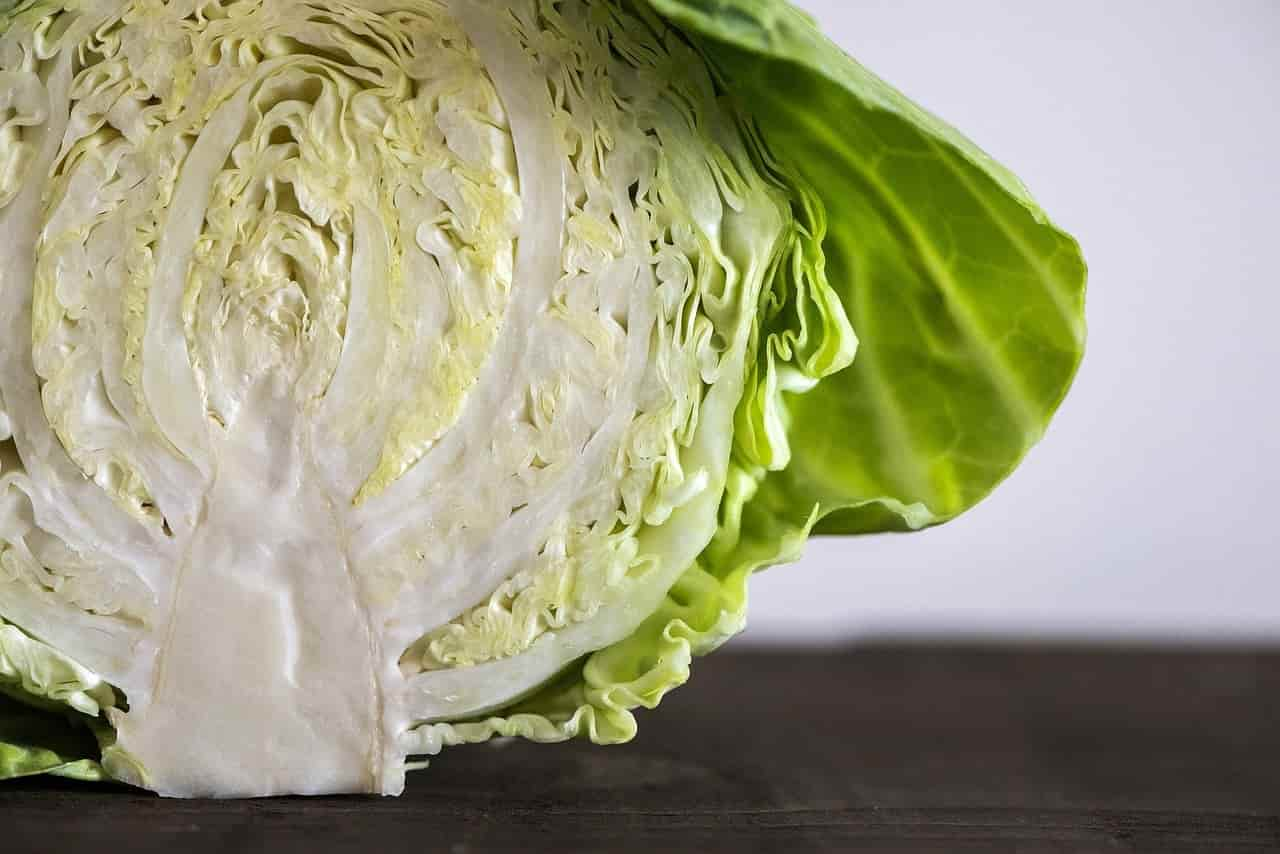
Can Rabbits Eat Cabbage Leaves?
Cabbage leaves are the most important part that can feed rabbits. They are healthy and provide good nutrients for the growth of rabbit’s health. Before buying cabbage, always look for crisp leaves and cabbages that have bright colors. Always supply fresh and good cabbages for rabbits.
Can Rabbits Eat Cabbage Stalks?
Yes, Rabbits can eat Cabbage stalks. There are no toxic compounds in Cabbage stalks. Cabbage stalks are a little bit thicker than Cabbage leaves. We can also cut them into small-sized pieces and serve them.
Other Good Foods You Can Provide To Rabbits
Rabbit’s diet should mainly be covered with quality hay and grass. In addition, we can provide a small portion of vegetables and fruits. We recommend giving two cups of fresh vegetables to adult rabbits daily.
- Bell peppers
- Bok choy
- Brussels sprouts
- Mint
- Cilantro
- Endive
- Green leaf
- Red leaf
- Parsley
- Fennel
Fresh fruits should be served once or two times per week as a treat.
- Grapes
- Banana
- Berries
- Melon
- Peach
- Pear
- Plum
- Watermelon
- Papaya
- Pineapple
- Orange
Best Common Healthy Diet To Feed Your Rabbit
We need to make a good meal plan for rabbits. We need to provide them with good quality foods. Before feeding rabbits with new food, check whether it’s good for rabbits. As a good rabbit owner, check whether you cover all the guidelines mentioned below. It’s a general food guide for rabbits.
- Good Quality Grass Hay -I recommend Timothy hay as the most popular/good, all-around unlimited offer to your rabbits. Orchardgrass, meadow fescues are also good for rabbits. Hay is the main food supply. Hay will help your rabbits to stay healthy and strong and maintain a healthy digestive system.
- Fresh Water – Ensure rabbits can have clean, fresh water 24/7. Water bows are most commonly used to supply water for rabbits.
- Provide Good Quality Leafy Greens – Provide them with 5-6 varieties of safe washed green vegetables, weeds, herbs daily (arugula, basil, kale, cabbage, etc.). Try to introduce new greens in small portions.
- Treats & Fresh Fruits – For the safety of rabbits, only provide 1 -2 tablespoons per day. Feed carrots, apples, blueberries, etc.
- Provide Good Quality Pellets – It is good to have a small number of healthy pellets daily. There are too many products out there, keep it in your mind to supply quality and healthy foods for rabbits.
(source -.https://www.rspca.org.uk/)
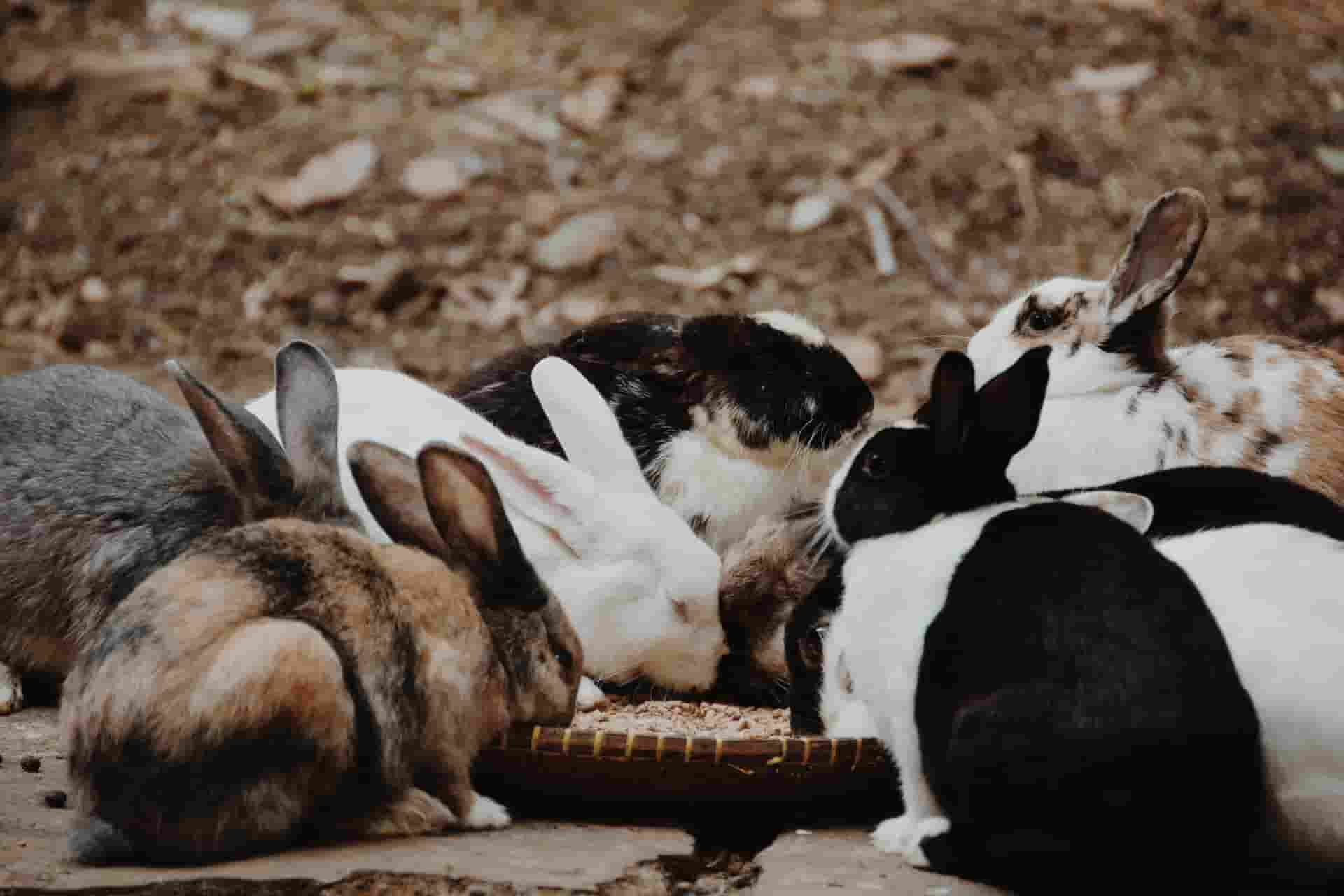
Summary
Now we know Cabbage is a good source of vegetable for rabbits. Cabbages are high in vitamin C, vitamin K, vitamin A, vitamin B complex, dietary fiber, folate, potassium, and manganese, etc. We can give Cabbage for 4-5 days per week, that is more than enough for rabbits. We can provide 4-5 cabbage leaves for adult rabbits.
When you are buying cabbage, always check whether those are fresh and of good quality. It’s better if we can provide organic Cabbages to rabbits. Don’t try to overfeed them with Cabbage. You can also provide Cabbage by mixing it with other leafy greens and vegetables. You can provide 1 cup of mixed vegetables for a rabbit of 2 pounds body weight. You can add Cabbage to your rabbit’s diet a few times per week and don’t try to feed Cabbage to baby rabbits.
Thank you for reading today!!
